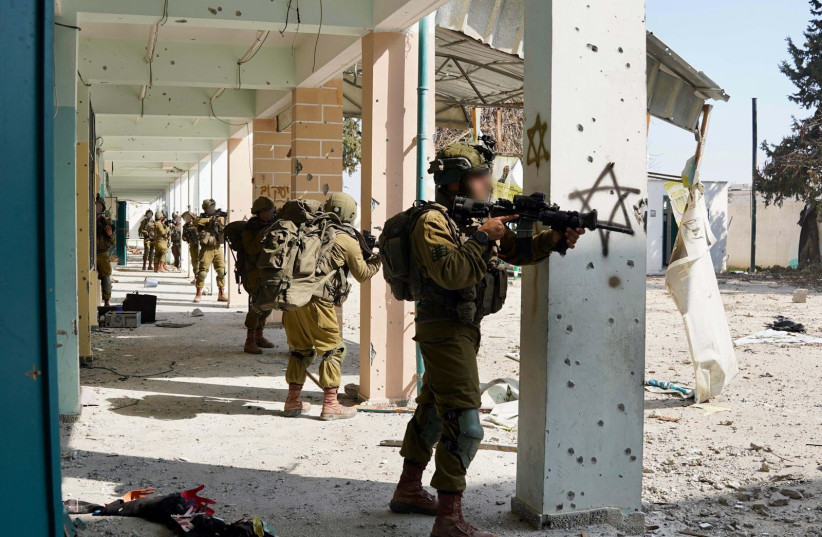A few major events surrounding war-crimes allegations against Israel have just taken place or are about to happen.
In the coming days, Israel will deliver its first alleged war-crimes update to the International Court of Justice. On January 26, the court ordered Israel to deliver the report within 30 days.
This came only days after IDF Military Advocate-General Maj.-Gen. Yifat Tomer Yerushalmi broadcasted a letter to the entire military, warning that the IDF had entered a new stage in which disciplinary and criminal issues, which may have moved forward slowly because of the war, will move forward more seriously.
The nearly simultaneous timing of these two events was no coincidence.
Earlier this month, IDF said it planned to produce a larger interim report on the alleged war-crimes probes against soldiers in late March or April. Though only an interim report, this will be even more comprehensive than the ICJ report.
The military’s decision to produce such a report relates directly to the ICJ report, likely additional ones, and most importantly, a report for the US, which is set for March.

Part of the process included vetting the files for cases involving higher numbers of alleged civilian casualties or that had received greater media attention. These could include incidents in which the IDF allegedly mistakenly killed journalists in Lebanon with no suspected terrorist ties.
Another part of the process involved categorizing files by how far along the initial probes were, as well as how quickly they might be able to be advanced toward arriving at initial decisions.
Part of the problem is that if after the 2014 Gaza conflict, the IDF performed 500 initial probes and 32 full criminal probes, the scope of the current war so dwarfs that conflict that the IDF is expected to have to perform thousands of initial reviews to determine how many criminal probes are needed.
The Hamas operative killed
Advancing an interim report on select cases was designed to address concerns about progress and transparency.
In early February, the US announced that Israel would have 45 days, until around March 23, to file a report on its war-crimes probes and compliance with international law, should it want US arms supplies to continue.
Some cases were featured in the media and might find their way into the reports. It could be something like an IDF doctor accusing his soldier colleagues of murdering an arrested and unarmed Hamas terrorist while in custody, as well as mistakenly detaining a group of Palestinians for over a week without properly checking their identities.
A military doctor had treated a wounded and neutralized Hamas prisoner, only to later see him executed, without cause, by a soldier guarding him, Yediot Aharonot’s Nachum Barnea reported in early February. The Jerusalem Post has learned that until the IDF doctor spoke to Barnea, the IDF did not know that he was a potentially relevant witness.
Some within the military apparatus believe he may not have been present at the moment the prisoner was killed, and that this is why none of the other soldiers thought to mention him.
Alternatively, the other soldiers may have left him out, realizing he would go against their narrative, and the doctor may have gone to Barnea, believing that the IDF would not fairly assess the incident without outside pressure.
The Post has learned that the soldier said the prisoner was not handcuffed and picked up a sharp object from the ground while standing only a few steps away from him.
The IDF said the soldier had been arrested within 24 hours, and that it quickly took his and others’ testimonies, with no real change in their narratives at different points in time.
In contrast, in cases where IDF soldiers have been convicted of manslaughter or negligent homicide, such as the Elor Azaria or Ben Deri cases, the narrative often changes over time.
Another case that received media attention was a Haaretz report in early February that seven Palestinian victims were detained in IDF military courts for eight days by mistake for crimes they were the victims of.
Simply put, the IDF arrested thousands of Palestinians so fast that it has switched from processing initial judicial hearings within 48 hours to within eight days.
This means that completely innocent Palestinians could – and in at least one case did – have no recourse at all to prove their innocence and could be stuck in prison for more than a week for essentially no reason.
The Post understands that the IDF’s position is that the explosion of terrorist threats with the advent of the war left it no choice but to conduct mass arrests, and that there was no way to conduct initial judicial proceedings within 48 hours.
That being said, the IDF position is that it has significantly increased the number of IDF prosecutors and judges, drawing on reservists, to try to catch up and process the cases more efficiently.
One idea that the IDF could consider would be having prosecutors intervene in probes more often. In some cases, not only do the judges not see the cases prepared by the police for eight days, but neither do the prosecutors.
If they broadened the volume of cases where they supervise more carefully, they might catch errors sooner.
The probes might also, at some point, address widespread media reports of soldiers stealing Palestinians’ possessions.
